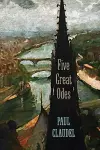
Five Great Odes
Paul Claudel - Paperback
£13.50 was £15.00
Paul Claudel (1868-1955) was a French poet, dramatist and diplomat, and the younger brother of the sculptor Camille Claudel. A devout Catholic, he was best-known for his verse dramas. He was born, in the Aisne departement, into a family of farmers and government officials. His father was a financier, while his mother came from a family of farmers and priests. An unbeliever in his teenage years, Paul experienced a sudden conversion at the age of eighteen on Christmas Day 1886 while listening to a choir sing Vespers in the cathedral of Notre Dame de Paris. He would remain an active Catholic for the rest of his life. As a young man, Claudel seriously considered entering a monastery, but in the end took up a post in the diplomatic corps, in which he would serve from 1893 to 1936. He was first vice-consul in New York, and later in Boston; French consul in various cities in China (1895-1909); then later in Prague, Frankfurt, Hamburg, and Rome. He was Minister Plenipotentiary in Rio de Janeiro, and then Copenhagen (1920); ambassador in Tokyo (1921-1927), Washington, D.C. (1928-1933) and Brussels (1933-1936). In 1936 he retired. Due to his position in the Diplomatic Corps, during his early career Claudel published either anonymously or under a pseudonym. This led to him remaining obscure figure until the editors of the Nouvelle Revue Francaise recognised his work and began collaborating with him. The best-known of his plays are Le Partage de midi (1906), L'Annonce faite a Marie (1910), and Le Soulier de satin (1931). He also wrote the text for Jeanne d'Arc au Bucher (1939), Honegger's 'opera-oratorio'. In addition to the verse dramas, Claudel also wrote a substantial corpus of lyric poetry.